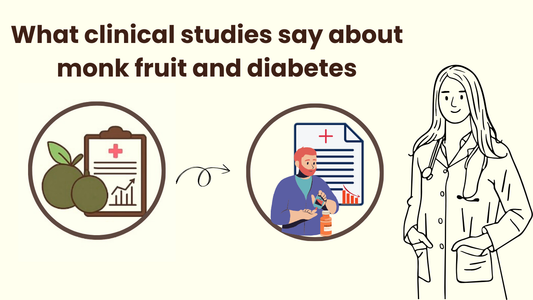The Sweetener Everyone’s Talking About
You’ve probably seen erythritol on ingredient lists - in sugar-free chocolates, protein bars, chewing gum, and even monk fruit sweeteners (including EPRA Farms blend).
For some, it’s a savior: sweetness without sugar, almost zero calories, safe for diabetics.
For others, it’s suspicious: “Is it really natural? Does it cause side effects? I heard it’s linked to heart problems?”
👉 So what’s the truth? Let’s break down what research actually says about erythritol.
What Exactly Is Erythritol?
-
Type: Sugar alcohol (polyol).
-
Natural sources: Found in small amounts in fruits (pears, grapes, watermelon) and fermented foods (cheese, wine, soy sauce).
-
Commercial production: Made by fermenting glucose with yeast (usually from corn).
-
Sweetness: ~70% as sweet as sugar.
-
Calories: Almost zero (0.2 kcal per gram).
-
Metabolism: Absorbed in the small intestine, excreted unchanged in urine.
👉 Translation: your body absorbs it but doesn’t break it down → so no calories, no blood sugar spike.
Why People Like Erythritol
-
Zero Glycemic Index → Doesn’t raise blood sugar or insulin.
-
Safe for Diabetics → Clinical studies confirm minimal glucose impact.
-
Tooth-Friendly → Doesn’t feed mouth bacteria, reduces cavities.
-
Gut-Friendly (Compared to Others) → Unlike xylitol or sorbitol, it rarely causes bloating because most is absorbed.
-
Pairs Well → Blends smoothly with intense sweeteners like monk fruit to mimic sugar taste.
The Research on Safety
General Safety
-
Approved by FDA, EFSA, and Japan’s FOSHU as safe for human consumption.
-
Multiple studies show no impact on blood sugar, cholesterol, or blood pressure.
Gut Tolerance
-
Erythritol is better tolerated than other sugar alcohols.
-
Up to 1 g per kg body weight (70 g for a 70 kg adult) is generally safe without major issues.
-
Some people may experience mild bloating at very high doses.
Long-Term Use
-
Human studies up to 2 years show no adverse health effects.
👉 Overall, research has consistently found erythritol safe for most people.
The Controversy: 2023 Heart Disease Study
In 2023, a study in Nature Medicine made headlines: “Erythritol linked to heart attack and stroke risk.”
What the study found:
-
People with high blood erythritol levels had higher rates of heart problems.
-
Lab tests showed erythritol may increase blood clotting in test tubes.
But here’s the nuance:
-
The participants were already older, overweight, and at high cardiovascular risk.
-
The study showed correlation, not causation. High erythritol levels in blood can also come from the body producing it naturally under stress.
-
Later reviews by FDA and EFSA emphasized that current approved levels remain safe.
👉 Media headlines exaggerated the risk. Current evidence does not prove erythritol causes heart attacks.
How Scientists Interpret It
-
Caution, not panic. Researchers say more studies are needed, especially in high-risk groups.
-
For healthy individuals consuming moderate amounts, erythritol remains considered safe.
-
Diabetics using erythritol instead of sugar may reduce far bigger risks (blood sugar spikes, insulin resistance, obesity).
Comparing Erythritol With Other Sweeteners
|
Sweetener |
Calories |
Blood Sugar Impact |
Side Effects |
Trust Factor |
|
Sugar |
4 kcal/g |
High (spikes) |
Obesity, diabetes |
Familiar but harmful |
|
Aspartame |
0 |
None |
Controversial, safety debated |
Low |
|
Sucralose |
0 |
None |
Possible gut effects |
Medium |
|
Stevia |
0 |
None |
Bitter aftertaste |
High |
|
Xylitol |
2.4 |
Low |
Digestive upset, toxic to dogs |
Medium |
|
Erythritol |
0.2 |
None |
Mild bloating at high doses |
High |
|
Monk Fruit |
0 |
None |
Expensive, rare |
Very High |
👉 Erythritol + Monk Fruit = clean sweetness, good taste, safe profile.
The India Context
In India, “sugar-free” usually means artificial sweeteners like aspartame or sucralose. Many people distrust them. Erythritol is still new but has huge potential:
-
It’s naturally derived, not synthetic.
-
It works in cooking, baking, hot and cold drinks.
-
It pairs perfectly with monk fruit (EPRA’s blend).
👉 Educating Indians about erythritol’s safety is key to building trust.
Where EPRA Farms Stands
We use erythritol in our monk fruit blends for a reason:
-
It balances monk fruit’s intense sweetness, giving sugar-like taste.
-
It’s natural (fermented from corn), not artificial.
-
It’s safe for diabetics, families, and everyday use.
-
Always transparently labeled - no hidden additives.
👉 Because clean sweetness should also be honest sweetness.
FAQs
Q: Does erythritol raise blood sugar?
No. Multiple studies show zero glycemic impact.
Q: Is erythritol safe for diabetics?
Yes. It’s one of the best sweeteners for diabetes management.
Q: Can it cause bloating?
At very high doses, yes. But far less than other sugar alcohols.
Q: Does erythritol cause heart disease?
No causal link proven. The 2023 study raised questions, but regulators still classify erythritol as safe.
Q: Is it natural?
Yes. Found in fruits, commercially made by fermentation.
Conclusion: Safe, With Honest Science
Erythritol is perfect:
-
Safe for most people at normal intake levels.
-
No impact on blood sugar or insulin.
-
Tooth-friendly, gut-friendly, calorie-free.
-
Controversy exists, but evidence doesn’t prove harm.
👉 Compared to sugar, erythritol is the safer choice by far.
👉 Compared to artificial sweeteners, it’s more trusted and natural.
👉 Paired with monk fruit, it’s the clean sweetness India needs.
At EPRA Farms, we use erythritol because it’s not just safe - it’s part of the future of science-backed, clean-label sweetness.





